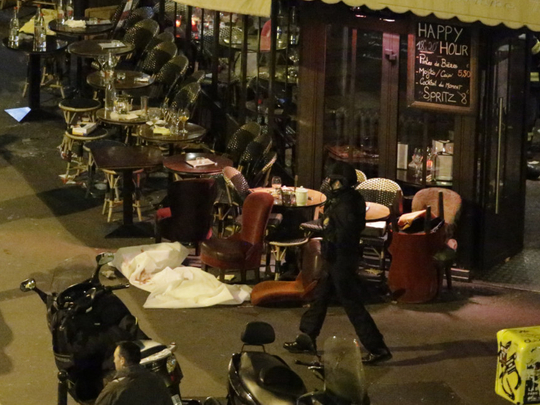
It was unfortunate that President Barack Obama declared Daesh (the self-proclaimed Islamic State of Iraq and the Levant) to have been “contained” only hours before its horrific slaughter in Paris. Those words have come back to haunt him.
Europe’s deadliest act of terrorism in a decade has already changed the contours of America’s 2016 presidential debate. The evidence is in the language. French President Francois Hollande has said France will wage a “pitiless” war on terrorism. Pope Francis said we are in the midst of a “piecemeal World War Three”. Republicans have been falling over each other to say “I told you so”.
Democrats, on the other hand, have been careful to avoid straying into warlike vocabulary. Their discipline is admirable. But it will come at a rising political cost.
Even before the carnage in Paris, the sands of American public opinion were shifting. Last week, a majority said they were prepared to put more American troops into Iraq and Syria to defeat Daesh. After last Friday, that number is likely to rise. The pressure on Obama to take more drastic action, such as agreeing to “no-fly zones” within Syria, is rising. At nearly every point, Obama has been caught behind the curve on Syria. In early 2014, he described Daesh as “junior varsity”, which meant they were unlikely to trouble the grown-ups. Within weeks, the group had taken control of up to a third of Iraq and was spreading rapidly in Syria. Whatever the reality on the ground today, Americans are prone to distrust Obama’s reassuring words on Daesh.
He is losing his grip on the language. When he came into office, Obama quietly dropped George W Bush’s “war on terror”. That downgrade looks unlikely to outlast his period of office. It was motivated by the view that the US had brought much of the terror on itself by the mistaken 2003 invasion of Iraq, which Obama vowed to undo. By 2011, all American troops were out of Iraq.
But the success of Daesh, which filled much of the vacuum left by a departing United States, has challenged Obama’s worldview. Instead of seeing Daesh as a product of the botched aftermath of the US invasion of Iraq — notably the decision to disband Saddam Hussain’s Sunni-dominated army and leave Baghdad in the grip of the Shiites — many Americans see it as a result of Obama’s decision to pull out of Iraq in 2011. He has already put 3,500 troops back into Iraq. US public opinion would like to see more. The Paris attacks will increase that drumbeat.
Obama’s fellow Democrats have yet to catch up with that reality. Just 24 hours after the Paris attacks, the Democratic presidential candidates held their second primetime debate.
In the aftermath of Paris, last Saturday night’s debate was rebilled as a focus on US national security. Somebody forgot to tell the candidates. Even Hillary Clinton, who had by far the strongest foreign policy credentials on the podium, lacked a script. Her only reference to terrorism that anyone will recall was when she cited the attacks of 9/11 in defence of her close ties to Wall Street. That will also come back to haunt her.
Bernie Sanders, her socialist rival, made a perfunctory nod to the “barbarous” attacks in Paris before moving on to his signature topic of rising US inequality. It was as though they were talking about a natural disaster.
But politics also abhors vacuums — and Republicans are rushing to fill it. That too begins with a battle over language. Hillary refused to say the US was at war with “radical Islam”. The fight was with “jihadism”, she said. Her point was technically correct and derived from Bush’s wise decision after 9/11 to avoid branding Islam with the terroristic brush. Yet, she sounded tone deaf and provided easy fodder for Republicans. While she was speaking, Jeb Bush tweeted: “Yes, we are at war with radical Islamic terrorism.”
Donald Trump, who is still the Republican frontrunner, made a fool of himself by suggesting the Paris attacks would not have claimed as many victims if France permitted its citizens to carry concealed weapons. But Democrats should not draw comfort from Trump’s cartoonish asides. His case against illegal immigration — and his opposition to taking any refugee from Syria — has been given a boost. As in Europe, America’s tides are shifting rightward.
Is that shift inexorable? Not necessarily. Unlike in Europe, there is no mass movement of Syrians trying to enter the US. Even Mexicans have stopped doing that. Next year’s US election is still likely to be won or lost on the economy.
Yet, the fight against terrorism, which is where Democrats are weakest, is back on the agenda. That includes Hillary. She has yet to give a good explanation of why the US “leading from behind” in Libya was a good thing. Public opinion is jittery and Democrats have not found a way to address it. When Pope Francis sounds clearer on the nature of the threat, that has to be a problem.
— Financial Times









